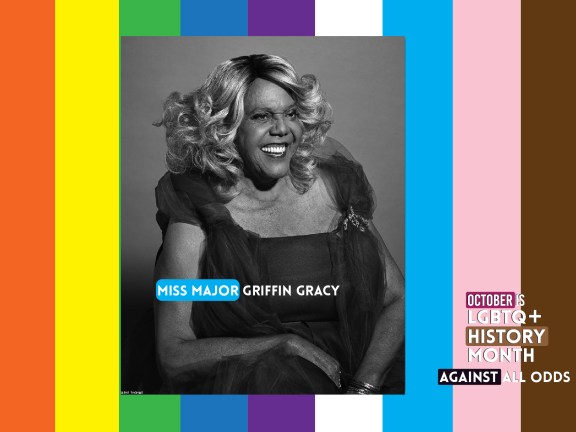Miss Major Griffin Gracy - Against All Odds

Miss Major Griffin-Gracy was born in Chicago in 1940, a time when the lives of transgender people—especially transgender women of color—were marked by profound marginalization and invisibility. Yet, from an early age, Miss Major exhibited a remarkable resilience and determination that would later define her legacy as one of the most enduring and impactful figures in LGBTQ+ history.
In her youth, Miss Major navigated a world that offered little acceptance to individuals like herself. As a Black transgender woman, she faced systemic discrimination not only due to her race but also her gender identity, often encountering hostility from both institutions and society. She turned these struggles into fuel for her activism. By the late 1960s, Miss Major had moved to New York City, where she became involved in the LGBTQ+ movement. She found herself in the midst of one of the most defining moments of that era: the Stonewall Uprising.
The Stonewall Uprising, which took place in June 1969, is often credited as the spark that ignited the modern LGBTQ+ rights movement. While many narratives center around white, gay men, Miss Major was one of the many transgender women of color present at the scene, fighting against police brutality and systemic injustice.
In the years following Stonewall, Miss Major became increasingly involved in advocating for transgender rights. Her activism was deeply informed by her own experiences with incarceration—a direct consequence of both her transgender identity and her race. Throughout her life, Miss Major faced the brutal reality of a criminal justice system that disproportionately punished Black and brown trans women. But instead of succumbing to despair, she used these experiences to become a fierce advocate for others.
One of Miss Major’s most significant contributions to the movement was her work with the TGI Justice Project (Transgender Gender-Variant & Intersex Justice Project). As the executive director, she worked to support incarcerated trans people, particularly trans women of color, who often experience abuse and neglect behind bars. Under her leadership, the TGI Justice Project provided crucial resources, legal aid, and advocacy for some of the most vulnerable members of the trans community.
Throughout her career, Miss Major has emphasized the importance of recognizing the intersectional nature of oppression. She understood that transgender women of color face unique challenges, compounded by systemic racism, sexism, and economic inequality. Her work has always sought to uplift those at the margins, centering the needs of people most often left out of mainstream LGBTQ+ movements.
Today, Miss Major’s legacy is one of resilience, compassion, and unwavering commitment to justice. She stands as a living testament to the power of community, survival, and resistance. Though she has faced countless hardships throughout her life, Miss Major continues to inspire new generations of activists who carry forward her mission to create a world where transgender people—particularly transgender women of color—can live with dignity, safety, and freedom.
October is LGBTQ+ History Month and this year we are spotlighting “Against all Odds”. These icons all achieved incredible success in spite of resistance, systematic barriers, and cultural norms. Demonstrating remarkable courage and resilience as they fought for a more accepting and inclusive world.


